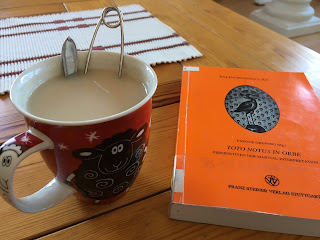This question could lead into a long monologue about my research, a more analytical reflection on the pros and cons of postgraduate studies, and sometimes it's just a sigh of frustration when faced with the challenges of a PhD project. I started my own PhD research last fall, but I've already had time to ponder this question from all these angles. I want to share some of these thoughts ja tell you why I decided to pursue a PhD, and what kind of an experience it has so far been.
I had thought about doing a PhD many times during my previous studies, but it was never a self-evident goal for me. Only when I found a suitable topic for my research did I make the decision. While writing my master's thesis I found Roman insults fascinating, and I also realized that doing independent research suited me. I could imagine spending a few years researching this topic. And that is the scale of a PhD, a really big master's thesis.
 |
| In Pompeii in the fall of 2019 |
Even though I was eager to begin my own research, I knew there many challenges ahead. First, I needed to write a research plan that was feasible and possible to execute, in order to apply to a doctoral program at my university. I thought I should build on my master's thesis on Pompeian graffiti, and decided to include the poems of Martial and expand from insults to stereotypes. I spent about half a year reading literature and wrote a few versions of my research plan before I applied. I was accepted in a PhD program at the University of Turku in the spring of 2020 and began my doctoral studies last fall.
Another challenge has been acquiring funding for my research so that I wouldn't have to have another job on the side. Many foundations and universities provide full-time funding for PhD research. The number of applicants, however, is large and only a small percentage of them receive funding. I've written over a dozen applications in the past year and most of them have been unsuccessful. I've received two short term grants that have lasted a couple months, and I've continued to teach Latin. I was very fortunate when I finally received a twelve-month-long fellowship at the Finnish Institute in Rome. I get to do my research in Rome for a year starting next September. I need to keep writing applications, however, to get funding for the following years too.
I'm still learning the everyday routines of research. Undergraduate studies were more structured and had clearer requirements. Doctoral studies are more independent and require self-discipline and more careful time management. It's good to have some course work as it's nice counterbalance to my own research. I've been taking classes in communication, research skills, Italian and paleography among others.
 |
| Some tea and Martial |
Sunt bona, sunt quaedam mediocria, sunt mala plura quae legis hic: aliter non fit, Avite, liber.
There are good things that you read here, and some indifferent, and more bad. Not otherwise, Avitus, is a book made. (Mart. 1.16)
You don't have to master everything at once and everything doesn't have to be perfect in the end. Doctoral studies are about learning to do research. Learning new things, challenging myself and the new opportunities that research offers are the most important reasons why I decided to do a PhD.
This text was originally written in Finnish for the magazine Caligula published by Palladion, the student association in Classics at the University of Turku.

No comments:
Post a Comment